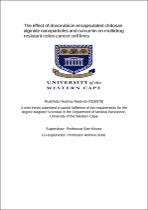| dc.contributor.advisor | Star, Khoza | |
| dc.contributor.author | Audrey Masindi, Mutshidzi | |
| dc.date.accessioned | 2024-01-22T14:08:02Z | |
| dc.date.available | 2024-01-22T14:08:02Z | |
| dc.date.issued | 2024 | |
| dc.identifier.uri | http://hdl.handle.net/11394/10617 | |
| dc.description | >Magister Scientiae - MSc | en_US |
| dc.description.abstract | Purpose: Although chemotherapeutic drugs have improved the survival rate of patients diagnosed with colorectal cancer, resistance to chemotherapy frequently leads to therapeutic failure and poor patient outcomes. Multidrug resistance (MDR) is a serious threat to cancer treatment efficacy and may be linked to the overexpression of drug efflux pumps. P-glycoprotein (P-gp) is a drug efflux transporter that triggers doxorubicin (DOX) resistance. This has led to an interest in chitosan alginate nanoparticles (CANPs) as novel anticancer drug carriers and curcumin (CUR) as an inhibitor of P-gp. Chitosan (CS) and alginate (ALG) are among the most extensively used polymers for nanoparticle (NP) preparation as they possess excellent non-toxic and biodegradable characteristics. The aim of this study was to investigate the effect of DOX encapsulated CANPs and CUR on MDR colon cancer cell lines (Caco-2 cells). | en_US |
| dc.language.iso | en | en_US |
| dc.publisher | University of the Western Cape | en_US |
| dc.subject | Cancer | en_US |
| dc.subject | Chitosan | en_US |
| dc.subject | Alginate | en_US |
| dc.subject | Nanoparticles | en_US |
| dc.subject | Doxorubicin | en_US |
| dc.title | The effect of doxorubicin encapsulated chitosan alginate nanoparticles and curcumin on multidrug resistant colon cancer cell lines | en_US |
| dc.rights.holder | University of the Western Cape | en_US |

